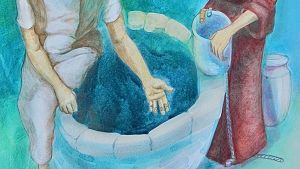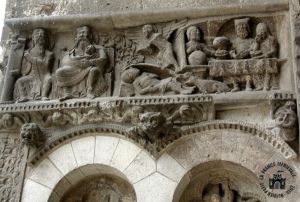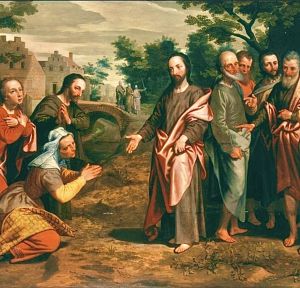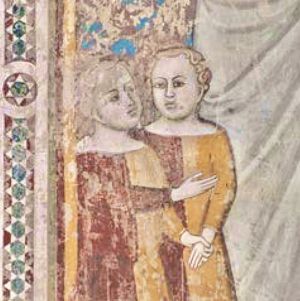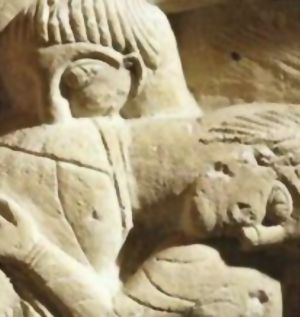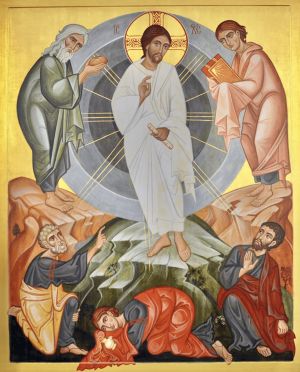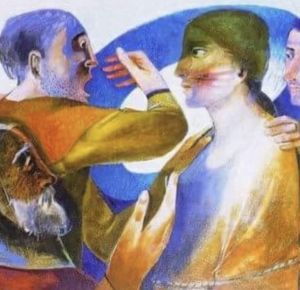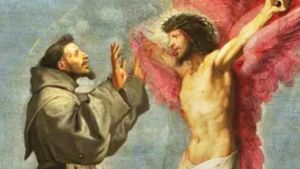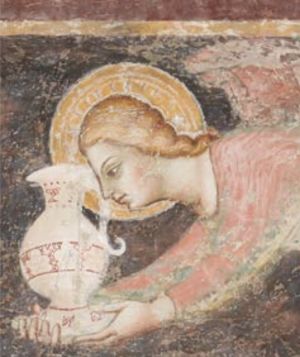
Teresa Girolami
Teresa Girolami è laureata in Materie letterarie e Teologia. Ha pubblicato vari testi, fra cui: "Pellegrinaggio del cuore" (Ed. Piemme); "I Fiammiferi di Maria - La Madre di Dio in prosa e poesia"; "Tenerezza Scalza - Natura di donna"; co-autrice di "Dialogo e Solstizio".
Samaritan woman, Francis, Clare: worship in Spirit and Truth
Crumbs
The Gospel proposed by today's liturgy sets before us three important existential dimensions, which Francis held in high regard.
The parable of poor Lazarus and the immoderate rich man evokes the diligent use of riches, care for the needy, and is a call to conversion, since after death, individual judgement will be irreversible.
Francis, the Poor Man of Assisi, always had this Gospel picture before his eyes, which led him to better direct his heart towards God and the poor.
The Sources attest, from the very beginning of his journey:
"(Francis) had always benefited the needy, but from that moment on he firmly resolved never to refuse alms to the poor who asked for them for the love of God, and on the contrary to make spontaneous and generous donations.
To every poor man who asked for charity, when Francis was away from home, he provided with money; if he lacked it, he gave him his hat or belt, so as not to send him back empty-handed.
Or if he lacked these, he would withdraw to the sidelines, take off his shirt and secretly give it to the indigent, begging him to take it for the love of God.
He bought utensils that the churches needed and secretly gave them to poor priests' (FF 1403).
And again, the Legend of the Three Companions informs us:
"Divine Grace had profoundly changed him. Although he did not wear a religious habit, he longed to find himself unknown in some city, where he could barter his clothes for the rags of a beggar and try begging for the love of God himself' (FF 1405).
The Minim knew that what a poor man received was addressed to Christ himself and that a single glass of water given to the small and marginalised was offered to Jesus.
His encounter with the leper in the plain of Assisi had turned bitterness into true sweetness in him.
Francis feared divine judgement and wanted to respond to what the Word of God demanded of him.
Clare herself, from a young age, took food from her body to give to the poor, maintaining this attitude of special care and concern for the needy - all her life.
Both made an evangelical, intelligent use of the goods at their disposal in the service of the Kingdom of God.
«Son, remember that you received your goods in your life, and Lazarus likewise the evils; but now here he is comforted, you on the other hand are tormented» (Lk 16:25).
The Poor Man always exhorted his brothers to be merciful to all forms of indigence, because judgement does not grant full life to those who do not acknowledge it to their brothers.
Thursday 2nd wk. in Lent (Lk 16:19-31)
Greatness of service: «Not so among you»
Jesus announces his death for the third time and reminds his own not to be like those who rule over the nations, oppressing them. Whoever wants to become great must be a servant, like Him who did not come to be served, but to serve.
Thanks to the light received from the Spirit, Francis and Clare had learnt to incarnate the Word of God on a daily basis.
The target of their action was Christ to be recognised and served in the brothers or sisters, but also to be helped in those who knocked on the door or met along the way.
The children of the kingdom of heaven do not rule, but humbly serve their neighbour.
Jesus' disciples do not aspire to prestigious positions, but to conform to the identikit outlined in the Beatitudes.
Hence the active understanding of what the Sources propose.
"They [the brothers] occupied the day in prayer and working with their hands, so as to resolutely avoid idleness, the enemy of the soul [...].
They loved each other with a deep affection, and served and provided for each other as a mother would do with her only tenderly loved child.
Such was the affection that burned in their hearts, that they were ready to give themselves up to death without hesitation, not only for the love of Christ, but also to save the souls or bodies of their brethren" (FF 1446).
«Just as the Son of Man did not come to be served, but to serve and to give his life as a ransom for many» (Mt 20:28)
And Clare herself, enclosed within Damianite walls, offered in simplicity to her sisters the witness of all-round service.
"From then on she no longer refused any servile duties, to the point that she was the one who poured water over the sisters' hands, stood to assist them while they sat and served them at table while they ate.
She hardly gave any orders: but she did it herself spontaneously, preferring to carry them out herself rather than command her sisters" (FF 3180).
"She washed the seats of the infirm, she cleansed them herself, with that noble spirit of hers, without shying away from filthiness or disgusting the stench" (FF 3181).
The Minim and the Poor Woman of San Damiano had received as a gift a pure heart, inflamed by Charity, at the service of the Kingdom.
Looking at Jesus, the Author and Perfecter of the law, they had acquired His likeness as servants, to redeem the dispersed multitudes.
Wednesday 2nd wk. in Lent (Mt 20:17-28)
More willing to serve than to appear
Jesus urges the crowd to listen and observe what the scribes and Pharisees say, without doing according to their works, because of the obvious contradiction between their saying and doing.
The Lord also calls for humility and service.
The Poor Man of Assisi had made poverty the guiding motif of his life. We are not speaking only of material poverty, but first and foremost of spiritual poverty - with the numerous "sisters"... Humility, discretion, concealment; fleeing all forms of power and appearances, as the scribes and Pharisees loved to do - rebuked, in today's passage, by the Master Jesus.
«They say and do not do [...] All their works they do to be admired by the people» (Mt 23:3.5).
Francis was convinced that virtue must remain hidden, far from seeking admiration.
In the Sources, Celano reiterates:
"In this way Francis had rejected all glory that did not know Christ and had inflicted a radical repudiation on human praise.
He well knew that the price of fame diminished the secret price of conscience, and that it is far more harmful to abuse virtue than to lack it at all [...].
[We, on the other hand] patiently endure not being good, but we do not resign ourselves to not seeming so nor to not being believed so.
Thus we live completely in the pursuit of men's esteem, because we are nothing but men' (FF 723).
He continues, regarding the Poverello:
"Humble in demeanour, most humble in feeling, most humble in his own esteem.
By nothing could one distinguish that this prince of God held the office of superior, if not by this most shining gem, that is, that he was the least among the least.
This was the virtue, this was the title, this was the badge that indicated him as minister general.
His mouth knew no haughtiness, his gestures no pomp, his acts no ostentation" (FF 724).
Moreover, Francis, faithful to the Lord, "did not want to give anyone the title of 'father' or 'master', nor write it in his letters, out of respect for the Lord who said: 'do not call anyone father on earth, nor be called master'" (FF 1615).
So, the Minim loved to make himself a servant in the footsteps of Christ, as Clare herself practised in San Damiano among her sisters.
From the Legend, contained in the Sources, we learn:
"Clare, the primary stone and noble foundation of her Order, from the beginning studied to set the edifice of all virtues on the foundation of holy humility.
She promised holy obedience to blessed Francis, and never deviated in any way from this promise [...].
she would have wished to humbly submit rather than be at the head, and among the handmaids of Christ more willingly to serve than to be served.
[...] Compelled by blessed Francis, she finally assumed the government of the Women: and from this was born in her heart fear, not arrogance; and there grew not independence, but the spirit and practice of service.
For the more she sees herself elevated by these appearances of superiority, the lower she finds herself in her own esteem, more ready for duty, more humble even in outward appearance" (FF 3179)
«He who is greater among you shall be your servant» (Mt 23:11)
Tuesday 2nd wk. in Lent (Mt 23:1-12)
Measure without measure
Jesus calls us to avoid all judgement, to be merciful, giving with breadth.
After his conversion, Francis had experienced that the measure of Love is not having any.
Helped by the Good Samaritan, he had learnt to give overflowingly and joyfully to anyone who asked for the love of God.
Moreover, conforming to the Word of the Gospel that invites us to be merciful, he was animated by true compassion towards all those in need, starting with lepers, whom he once repudiated.
In the Sources, a jewel of early documentation, on the subject of judgement seasoned with mercy, we read:
"Those then who have received authority to judge others, let them exercise judgement with mercy, just as they themselves wish to obtain mercy from the Lord; for judgement will be without mercy for those who have not used mercy" (FF 191 - Letter to the Faithful).
The Minim had once had a singular experience of compassion on the plain of Assisi:
"Francis, while one day he was riding near Assisi, met a leper on the road.
Of these unfortunates he felt an invincible revulsion; but this time, doing violence to his instinct, he dismounted from his horse and offered the leper a coin, kissing his hand.
And receiving a kiss of peace, he got back on his horse and continued on his way.
From that day he began to free himself from his own selfishness, to the point of knowing how to overcome himself perfectly, with God's help" (FF 1407).
This encounter revolutionised his mentality, transforming him profoundly.
He urged his companions by example to make themselves a continuous gift to every indigent person.
"Nothing they considered private property [...] they were spontaneously generous with everything that was offered to them in the name of God. They joyfully donated, for love of Him, the alms they collected, to those who asked for them, especially the poor" (FF 1450).
Salvation received gratuitously had become a yardstick for them in their relations with their neighbour.
«Be merciful, as your Father is merciful»
«Do not judge and you will not be judged» (Lk 6:36-37)
Monday, 2nd wk. in Lent (Lk 6:36-38)
The wind of applause, only outside
On this Sunday of Lent, the Gospel recounts the Transfiguration of Jesus on Mount Tabor before Peter, James and John. The disciples, amazed, fall face down before such splendour, while from the cloud that covers them, the Voice of the Father calls them to listen to the Son, the object of his pleasure.
The Sources recount that 'the man of God, remaining alone and at peace, filled the woods with groans, sprinkled the earth with tears, beat his breast and, as if he had found a more intimate sanctuary, conversed with his Lord [...]
There, too, the friars, who piously observed him, heard him call out with cries and groans to divine goodness on behalf of sinners; they also heard him weep aloud for the Passion of the Lord, as if he had it before his eyes.
There, while praying at night, he was seen with his hands outstretched in the form of a cross, lifted off the ground with his whole body and surrounded by a luminous cloud: a marvellous light diffused around his body, which wonderfully testified to the light shining in his Spirit.
There, moreover, as reliable evidence testifies, the hidden mysteries of divine Wisdom were revealed to him, which he did not, however, divulge to others, except to the extent that the charity of Christ compelled him and the good of his neighbour required it [...]
When he returned from his prayers, which transformed him almost into another man, he took the greatest care to behave in harmony with others, so that the wind of applause, because of what he let slip outside, would not deprive him of his inner reward" (FF 1180 - Leggenda maggiore).
Francis guarded his transformation into 'Alter Christus' with great discretion, almost living in the cloister of his heart.
In fact, the same Sources attest:
"At first, when the true love of Christ had already transformed the lover into his own image, he began to conceal and hide the Treasure with such caution that even his closest friends did not discover it for a long time.
But divine Providence did not allow it to remain hidden forever and not come to the eyes of his loved ones [...]
One of his companions once, seeing the stigmata on his feet, said to him, 'What is this, good brother?'.
' Mind your own business," he replied (FF 719 - Second Life of Celano) with the frankness and simplicity that distinguished him.
«This is my beloved Son, in whom I am well pleased. Listen to him» (Mt 17:5)
Transfiguration of the Lord A (Mt 17:1-9)
Proudness in loving
Jesus proposes Perfection according to the Father: loving and forgiving even our enemies makes us sons.
Francis of Assisi often repeated that Love was not loved. Going beyond the considerations of the Old Testament (cf. Lev 19:18), for him one was called to love everyone and not to consider only one's fellow countrymen as neighbour.
«You have heard that it was said, 'You shall love your neighbour and hate your enemy. Now I say to you: love your enemies and pray for those who persecute you» (Mt 5:43-44).
In the writings of the Poor Man of Assisi [Paraphrase of the Our Father] we read:
"As we forgive our debtors:
and what we do not know how to fully forgive, you, Lord, make us fully forgive, so that, for your sake, we may truly love our enemies and devoutly intercede with you, rendering no one evil for evil, and striving in you to be of benefit to all" (FF 273).
In the Letter to a Minister:
"I say to you [...] every person who will be an obstacle to you, whether they be brothers or others, even if they cover you with beatings, all this I must consider as a grace [...].
And in this love them and do not expect them to become better Christians" (FF 234).
All this in order to be children of the heavenly Father, who makes the sun rise on all: good and bad.
Francis, in fact, in front of the scoundrels he met in a forest - while singing the praises of God in French - and who attacked him asking who he was, reacts thus:
"I am the herald of the great King; does this interest you?".
They beat him and threw him into a pit full of snow, saying:
"Stand there, ye herald of God!".
But he, turning this way and that, shaking off the snow, as soon as the brigands are gone, leaps out of the pit and, all joyful, resumes singing in a loud voice, filling the forest with praises to the Creator of all things" (FF 346).
Love your enemies in perfect joy!
Saturday 1st wk. in Lent (Mt 5:43-48)
Merciful Justice
Jesus calls for a non-formal Justice that follows the Father's criterion: seasoned with mercy, respectful.
Francis was a great spiritual teacher, almost without realising it.
He was convinced, by Grace, that justice always goes hand in hand with mercy.
A justice far from legalistic rigidism, eager to express itself in the fulfilment of God's will, in respect for one's brother always.
The Franciscan Sources teach:
"If it sometimes happened that a brother missed a word capable of wounding, the remorse of conscience would not let him have peace, until he confessed his mistake, humbly throwing himself to the ground and begging the offended person to put his foot on his mouth.
If that brother refused to make that gesture, when the offender was his superior, he would command him to put his foot over his mouth; when he was a subject, he would have the person in charge order him to do so.
In this way, the brothers strove to banish all rancour and incompatibility, and to keep the exchange of love intact.
They did all they could to replace every vice with the corresponding virtue, inspired and assisted in this by the Grace of Jesus Christ" (FF 1449).
Justice and Mercy to be sought, to be asked of God first of all in prayer and silence, because a new heart is a gift from the Lord, a continuous exodus.
In the Rule of the Hermitages, written by Francis, we read:
"Let these [the brothers] have a cloister, in which each one has his own small cell, in which he can pray and sleep [...] and get up for matins, and first of all seek the kingdom of God and his justice" (FF 137).
In the same Praises of God Most High, Francis expresses himself thus:
«[...] You are justice,
You are temperance,
You are all our riches enough» (FF 261).
The Poverello, knowing that the Lord-Justice called for a greater justice than that of manner, worked hard for the kingdom of heaven and tried to teach his brothers to do the same.
He never forgot that mercy always prevails in judgement before God.
«For I tell you, unless your righteousness abounds more [than that] of the scribes and Pharisees, you will not enter the kingdom of heaven» (Mt 5:20)
Friday 1st wk. in Lent (Mt 5,20-26)
Franciscan Transfiguration: without applause
Knock: it will be opened to you!
The Matthew passage emphasises the goodness of the Father, who does not give a stone to the son who asks for bread. Then here is the golden rule: what one wants for oneself, it is good to do for others.
For Francis of Assisi, giving to those in need was a law of life. This verb, 'to give', was often replaced by another typically Franciscan one: 'to give back'.
For him, handing over his cloak to a poor man who knocked on the door of his heart meant giving back what he had lent.
On the other hand, as the Gospel says, what we wish to be done to us, we must also do to our neighbour (cf. Mt 7:12).
At the same time, he considered it important and a sign of humility to know how to ask.
After his change of life, obeying the voice of the Crucifix of San Damiano and overcoming himself, he gave himself to countless labours.
The Sources narrate:
"Francis, a man of God, naked of the things of the world, consecrated himself to divine worship and, no longer minding his own advantage, committed himself to serving God in every way possible.
Returning to the church of St Damian, all happy and fervent, he put on a hermit's habit and comforted the priest of that church with the same words of encouragement addressed to him by the bishop.
Then, returning to the city, he began to walk through squares and streets, raising praises to the Lord with an inebriated soul.
As he finished his praises, he worked to obtain the stones needed to restore the church. He would say:
«Whoever gives me one stone, will have one reward; whoever gives me two stones, two rewards; whoever gives me three, as many rewards!».
With ardent enthusiasm he made this and similar appeals full of naivety, for this chosen one of God had a candid and childlike soul, he did not resort to the learned language of human wisdom, but was simple and immediate in everything" (FF 1420).
According to the Poverello, begging for the love of God was the noblest and most dignified gesture before the Lord and the world.
"And indeed, everything the heavenly Father has created for the benefit of mankind, he continues to give to us gratuitously even after sin, to the worthy as well as the unworthy, out of love for his beloved Son" (FF 1610).
«Ask and it will be given to you, seek and you will find, knock and it will be opened to you» (Mt 7:7)
Thursday 1st wk. in Lent (Mt 7,7-12)
‘Lazarus’ means ‘God helps’. Lazarus, who is lying at the gate, is a living reminder to the rich man to remember God, but the rich man does not receive that reminder. Hence, he will be condemned not because of his wealth, but for being incapable of feeling compassion for Lazarus and for not coming to his aid. In the second part of the parable, we again meet Lazarus and the rich man after their death (vv. 22-31). In the hereafter the situation is reversed [Pope Francis]
“Lazzaro” significa “Dio aiuta”. Lazzaro, che giace davanti alla porta, è un richiamo vivente al ricco per ricordarsi di Dio, ma il ricco non accoglie tale richiamo. Sarà condannato pertanto non per le sue ricchezze, ma per essere stato incapace di sentire compassione per Lazzaro e di soccorrerlo. Nella seconda parte della parabola, ritroviamo Lazzaro e il ricco dopo la loro morte (vv. 22-31). Nell’al di là la situazione si è rovesciata [Papa Francesco]
Brothers and sisters, a frequent flaw of those in authority, whether civil or ecclesiastic authority, is that of demanding of others things — even righteous things — that they do not, however, put into practise in the first person. They live a double life. Jesus says: “They bind heavy burdens, hard to bear, and lay them on men’s shoulders; but they themselves will not move them with their finger (v.4). This attitude sets a bad example of authority, which should instead derive its primary strength precisely from setting a good example. Authority arises from a good example, so as to help others to practise what is right and proper, sustaining them in the trials that they meet on the right path. Authority is a help, but if it is wrongly exercised, it becomes oppressive; it does not allow people to grow, and creates a climate of distrust and hostility, and also leads to corruption (Pope Francis)
Fratelli e sorelle, un difetto frequente in quanti hanno un’autorità, sia autorità civile sia ecclesiastica, è quello di esigere dagli altri cose, anche giuste, che però loro non mettono in pratica in prima persona. Fanno la doppia vita. Dice Gesù: «Legano infatti fardelli pesanti e difficili da portare e li pongono sulle spalle della gente, ma essi non vogliono muoverli neppure con un dito» (v.4). Questo atteggiamento è un cattivo esercizio dell’autorità, che invece dovrebbe avere la sua prima forza proprio dal buon esempio. L’autorità nasce dal buon esempio, per aiutare gli altri a praticare ciò che è giusto e doveroso, sostenendoli nelle prove che si incontrano sulla via del bene. L’autorità è un aiuto, ma se viene esercitata male, diventa oppressiva, non lascia crescere le persone e crea un clima di sfiducia e di ostilità, e porta anche alla corruzione (Papa Francesco)
This is the road Jesus points out to all who want to be his disciples: "Judge not... condemn not... forgive, and you will be forgiven; give, and it will be given to you.... Be merciful, even as your Father is merciful" (Lk 6: 36-38). In these words we find very practical instructions for our daily conduct as believers [Pope Benedict]
Questa è la strada che Gesù mostra a quanti vogliono essere suoi discepoli: "Non giudicate... non condannate... perdonate e vi sarà perdonato; date e vi sarà dato... Siate misericordiosi come è misericordioso il Padre vostro" (Lc 6, 36-38). In queste parole troviamo indicazioni assai concrete per il nostro quotidiano comportamento di credenti [Papa Benedetto]
Path of Lent, learning a little more how to “ascend” with prayer and listen to Jesus and to “descend” with brotherly love, proclaiming Jesus (Pope Francis)
duevie.art
don Giuseppe Nespeca
Tel. 333-1329741
Disclaimer
Questo blog non rappresenta una testata giornalistica in quanto viene aggiornato senza alcuna periodicità. Non può pertanto considerarsi un prodotto editoriale ai sensi della legge N°62 del 07/03/2001.
Le immagini sono tratte da internet, ma se il loro uso violasse diritti d'autore, lo si comunichi all'autore del blog che provvederà alla loro pronta rimozione.
L'autore dichiara di non essere responsabile dei commenti lasciati nei post. Eventuali commenti dei lettori, lesivi dell'immagine o dell'onorabilità di persone terze, il cui contenuto fosse ritenuto non idoneo alla pubblicazione verranno insindacabilmente rimossi.


